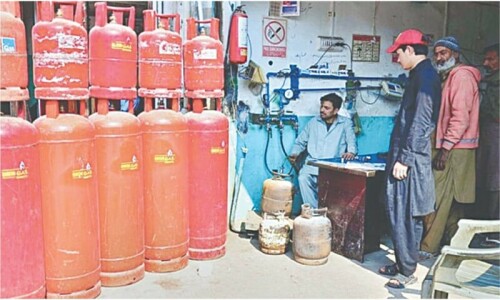ISLAMABAD: The oil industry has expressed concerns about its exclusion from an official working group tasked with developing a roadmap for deregulating the downstream oil sector.
In a letter to the Petroleum Division and Ogra, the Oil Companies Advisory Council (OCAC) — an association of over three dozen oil companies and refineries — has said it had requested the government in November last to include major private sector stakeholders in the working group for consultation on deregulation.
However, this remained a dream. “It is concerning to note that private sector refineries and oil marketing companies (OMCs), which play a pivotal role in the downstream oil industry, have not yet been included in the consultation process”, wrote OCAC’s chairman Adil Khattak to the secretary petroleum.
He said the oil industry was already facing existential challenges due to the exemption of sales tax on petroleum products, smuggling of petroleum products, delay in revision of OMC’s margin and other challenges highlighted repeatedly by the industry.
Mr Khattak demanded that the private sector be involved in the consultation process to develop a balanced and workable deregulation policy for the country. “Any unilateral decision on such a critical matter in haste will have severe ramifications for the oil industry and could intensify the existing challenges faced by it”, the OCAC wrote.
The letter followed a three-day deadline given last week by Petroleum Minister Dr Musadik Malik to the petroleum secretary for a working paper on deregulation desired by the Prime Minister’s Office and the Special Investment Facilitation Council (SIFC). The secretary had to travel abroad the next day, and the deadline expired again, like many others in the last two years.
Mr Khattak, also the chief executive officer of Attock Refinery, said the Petroleum Division had been avoiding consultations for deregulation and revision of the pricing mechanism of petroleum products, and the oil industry’s requests in this regard were going unheeded.
He said the 2024-25 budget was making normal operations unsustainable and jeopardising the implementation of the Brownfield Refining Upgradation Policy.
“While the sales tax issue still remains unresolved in spite of numerous meetings and directives of the prime minister and SIFC, taking up revision of petroleum products’ pricing mechanism at this stage is not only ill-timed but non-inclusion of private sector stakeholders in consultation can lead to complications as we have witnessed in the formulation and implementation of the Brownfield Refineries Policy over last five years”, Mr Khattak said.
He said that despite instructions from the prime minister and the finance minister for consultations with industry, “mandarins in the Petroleum Division think otherwise or maybe they feel more comfortable working with public sector companies only”, he deplored.
The government had taken in hand the process for deregulation of oil prices more than a year ago but had not moved beyond deadlines for working papers and presentations. In April last year, the Petroleum Division asked the Oil and Gas Regulatory Authority (Ogra) to share a presentation on the analysis and implications of deregulation of petroleum products” within three days.
The paper shared by the regulator kept piling up dust in the petroleum division until the PM Office recalled the issue in July. Even then, there was no progress on the ground as the minister and secretary of petroleum remained at arm’s length.
The government has been criticised for high petroleum product prices, even though it was not at liberty to change fixed tax rates on various products under the donor-dictated pricing mechanism. It wanted to get out of the process while the prices were now relatively lower.
The government’s only role is now limited to announcing fortnightly fuel prices calculated by Ogra to pass on the impact of the international market and exchange rate to consumers.
The oil industry has also been criticising the government for doing little to stop the massive smuggling of low-quality and cheaper products, particularly from Iran.
Published in Dawn, January 7th, 2025















































